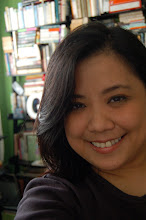 "Books are mirrors; you only see in them what you already have inside you.."
"Books are mirrors; you only see in them what you already have inside you.."
I finished reading Shadow of the Wind a few minutes ago. I'm breathless. Spent. Awed not just at the book but at the power of books like this to simultaneously dumbfound me and awake my emotions. And I'm writing this right now so that I don't chicken out of reviewing this book once the I-am-not-worthy feelings set in.
The Shadow of the Wind is "a story about lonely people, about absence and loss," says Daniel, the novel's narrator. It's also a story about pain, betrayal, vengeance, forgiveness, secrets, lies, evil, envy, about family dysfunction, a culture of sanctimony, about poverty in more ways than just material, about different ways people love and hate; is it too much to say that it is about the human condition?
Three narratives that mirror each other with uncanny similarities. Intensely emotional moments that take your breath away. Surprises that keep you gasping. Horrific events that make you want to turn your eyes away from the page. Love stories that make your heart bleed. A pace that leaves you panting and turning the pages even when your eyelids and heart say that you've had enough for one sitting. Too many coincidences that only a novel as spellbinding as this can get away with.
I like that though the story has layers of meaning that would reveal themselves in future rereadings, the first layer is already satisfying.
And the characters -- Don Ricardo Aldaya, his women, his secrets, and his fourteen thousand books. Fortuny, the hatter who dies alone and learns too late how to love. Jacinta and her Zacharias. The son of a warmonger Miguel, driven by anger, love, and principle. And Lain Coubert, and so many more. But my favorite is Fermin - who looks like Boris Karloff when he is asleep and dresses as if he were a screen idol, who is always either horny or hungry, but is always funny. Except when he's being beaten to a pulp by the vile Fumero. Fumero, so vivid in my mind in his sailor suit. All these characters, except maybe for the women Daniel and Julian love, have dimensions. You see both the good and the evil in them, and the reason for their evilness. You see the hero's cowardice and the villains' broken hearts.
I don't like some of the dialogue - stilted, unnatural. Maybe it's the translation. Maybe Zafon wants too much to narrate using the characters' words. And he does that a lot. Snippets, long italicized tracts of words from different people so you get the story in pieces, or in vague suggestions that can lead you to wrong conclusions. But in the end, he had to rely on Nuria's long Remembrance of the Lost to tie everything together, just in case you still haven't figured out the missing pieces.
There was one particular twist that I didn't like. Too much of a cliche. That I felt was unnecessary to move the story along. Crammed in the story are a lot of unoriginal subplots already seen in family dramas.
But you can forgive Zafon all that because this is reading that is what reading fiction is all about. It entertains you, and stretches your imagination, and inspires you to read more books.
This is my first read for 2009, and I couldn't have chosen a better one to start the year and continue my romance with the book.
Wednesday, January 7, 2009
THE SHADOW OF THE WIND by Carlos Ruis Zafon
Posted by
gege
at
5:00 PM
![]()
Labels: my book lust
Subscribe to:
Post Comments (Atom)












0 comments:
Post a Comment